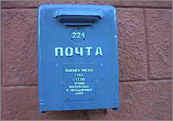| FR | About us | Home | User agreement | Link to us |
Addressing People in Russian
In Russian, there are two modes of address – using the polite "you" (Вы) and using the informal "you/thou" (ты). The choice of mode depends on how well you know the other person and whether you are superior or inferior in terms of age and position.
When to use formal "Вы"
Russians generally use the polite Вы when talking to strangers and older people. It is essentially a plural form of "you" used to refer to only one person. Using Вы is a sign of politeness and respect. The formal "you" is also common in official situations, business communication and various public institutions, such as banks, police or consulates. If the person's full name is known he or she is addressed with a combination of the first name and patronymic – for example, Иван Николаевич or Анна Аркадьевна. While the use of a given name (Иван) plus patronymic (Николаевич) is the golden standard of politeness, there has been a recent trend to only say the full version of the first name (but not a nickname) while still maintaining the formal-you mode.
Full and Short forms of the first name
Most first names in Russian have two forms – the full name and short name (aka "nickname" or "pet name"). The full form is the one you may find in the Russian passport and other official documents. The shortened unofficial version of a given name is often very different and has multiple variations. For example, Анна is called Аня for short, Иван becomes Ваня, and Сергей is known as Серёжа. Nicknames are common in everyday life among friends and relatives. Some first names, however, do not have a shortened version, for example Никита, Тарас, Анжела.
It is also worth noting that several male names end in "-a" which is typically a feminine ending in Russian grammar. At the same time, the shortened versions of some names are the same for both boys and girls. These include Саша (from the male name – Александр, female – Александра) and Женя (male name – Евгений, female – Евгения).
Switching to the "thou" basis
You can talk to someone using ты if you are close friends or know each other well. For instance, it is acceptable to refer to your work colleagues using ты (informal "thou") even if there is a substantial age difference between both of you. The members of the family and very close friends are also on the ты basis, often calling each other diminutive forms of their names, such as Серёженька for Сергей, and Анечка or Аннушка for Анна. The diminutive names are tender and affectionate nicknames derived from the first names. In Russia, you can accurately tell the degree of formality between people by listening to the way they address each other.
A word of caution: it is considered rude when you begin to address someone with ты when a more formal degree of formality is expected. There is even a special term for such situation–ты́кать–because it has ты́ in it but is also an actual verb meaning "to poke".
Russian Formality Vocabulary
фами́лия - surname, last name
и́мя - first name, given name
о́тчество - patronymic
уменьшительно-ласкательная фо́рма и́мени - diminutive form of the name, nickname
на "ты" - on the informal "thou" basis
быть на "ты" - to address each other informally
ты́кать - to rudely address someone informally when formal address is expected
Got questions?
Ask them in the Russian Questions and Answers — a place for students, teachers and native Russian speakers to discuss Russian grammar, vocabulary, pronunciation, and other aspects of the Russian language.
Copyright 2001-2026 MasterRussian.com | Privacy Policy | Contact Us
 Russian Lessons
Russian Lessons
- Russian alphabet
- Names of letters
- Russian Q&A new
- Pronunciation: Cons.
- Pronunciation: Vowels
- Noun Gender/Number
- Cases of Nouns
- Russian Greetings
- Personal Pronouns
- Learning Russian
- 1000 Common Words
- 500 Russian Verbs
- Top Russian Nouns
- » All lessons
- » Guest lessons
 Browse Topics
Browse Topics
- Start learning Russian
- Forum
- Bookstore
- Dictionaries
- Russian - basic
- Russian - adv
- Pronunciation
- Russian Blog new
- Reading
- Test & quizzes
- Translation
- Verbs
- Verb Conjugations
- Russian numbers
- Russian Tests new
- Vocabulary
- Writing
- Folk music
- Fun stuff
- Leo Tolstoy
- Learner's lore
- Literature
- Personal blogs
- Picture Dictionary new
- Proverbs
- Publications
- Radio & TV
- Russian culture
- Schools in Russia
- Russian Words
- Russian names
- Software
- Russian Words iPhone

Search MasterRussian

English » Russian dictionary

WORD OF THE DAY
![]() RSS
|
iGoogle
|
My Yahoo!
RSS
|
iGoogle
|
My Yahoo!
Meaning: the very, most, the same
Pronunciation: [SAH-miy]
Learn Russian words more... »
TODAY'S STREET SIGN

Russian: Почта
English: Post office
FOLLOW US ON TWITTER

MasterRussian on Twitter


